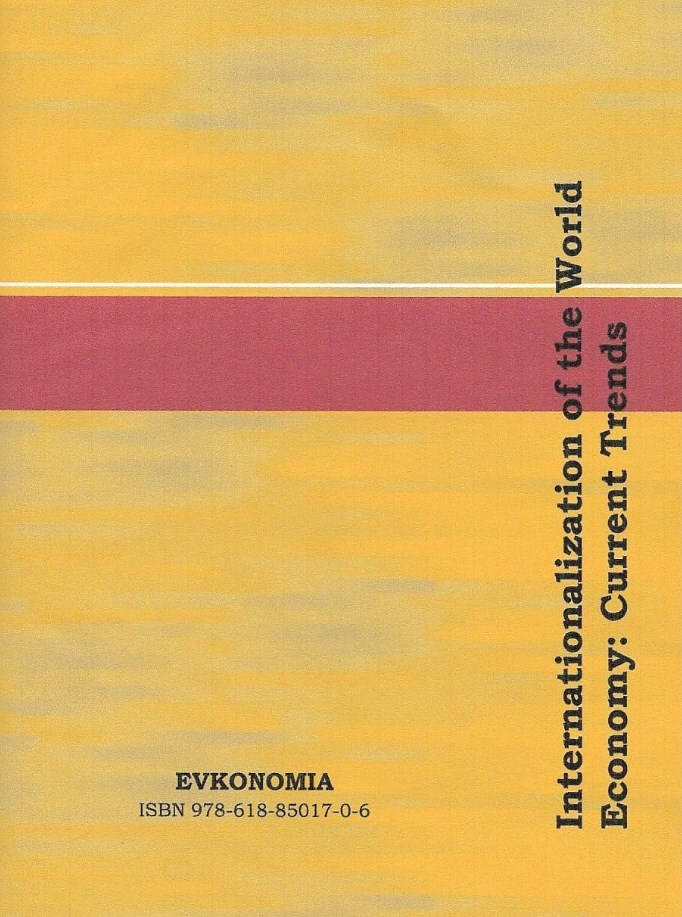Δημοσιεύθηκε η διεθνής επιστημονική μονογραφία στην διεθνοποίηση της παγκόσμιας οικονομίας, τις πολυεθνικές επιχειρήσεις και το παγκόσμιο εμπόριο που εκδόθηκε από τον εκδοτικό οίκο EVKONOMIA Publisher με την επιμέλεια του D.Sc. Econ. Ευάγγελου Σίσκου, καθηγητή του Τμήματος Διεθνών και Ευρωπαϊκών Οικονομικών Σπουδών του Πανεπιστημίου Δυτικής Μακεδονίας και του καθηγητή D.Sc. Econ. Rogach Oleksandr, Professor of World Economy and Head of International Finance Department of Institute of International Relations of Taras Shevchenko National University of Kyiv, Ukraine με τίτλο:
Evangelos Siskos, Oleksandr Rogach,. (Eds.) (2020). Internationalization of the World Economy: Current Trends. Kastoria: με ISBN 978-618-85017-0-6. Publisher EVKONOMIA .
The monograph examines trends and major implications of world economy internationalization, multinational enterprises network production, international division of labor, regional cooperation and global trade. The book presents analysis of different issues of financial globalization, international portfolio investing, loan financing of global business transactions. Special chapters highlight current issues of global trade focusing on e-commerce, ecologization and specific sectoral trends in oil and gas industry and international trade in food commodities. The reader is also presented with some problematic points concerning internationalization effect on labor market, regional peculiarities of internationalization.
CONTENTS
FOREWORD. . . . . . . . . . . . . . . . . . . . . . . . . . . . . . . . . . . . . . . . . . . . . . . 7
PART І. INTERNATIONALIZATION OF WORLD ECONOMY:
THEORETICAL ISSUES . . . . . . . . . . . . . . . . . . . . . . . . . . . . . . . . . . . .9
1. Network Production of Multinational Firms:
Dynamics and Structural Changes (Oleksandr Rogach) . . . . . . . . . . .11
2. The Black Sea Economic Cooperation Countries
and the Global Trade (Evangelos Siskos, Konstantia Darvidou) . . . . . . 39
3. International Division of Labour
and Internationalisation of Production (Anton Filipenko) . . . . . . . . . . .57
PART ІІ. INTERNATIONALIZATION OF FINANCE
AND NETWORK PRODUCTION . . . . . . . . . . . . . . . . . . . . . . . . . . . ……. .69
4. Financial Globalization and New Regulatory Setting for Banking
(Sergiy Tsyganov, Nadia Tsyganova). . . . . . . . . . . . . . . . . . . . . . . . . . . . .71
5. Accounting Moveon without Barriers:
From IFRS to Offshore Companies and Transfer Pricing
(Nicos Sykianakis, Georgios Thanasas) . . . . . . . . . . . . . . . . . . . . . . . . . . .91
6. Current Trends in International Portfolio Investing
(Pavlo Dziuba) . . . . . . . . . . . . . . . . . . . . . . . . . . . . . . . . . . . . . . . . . . . . .107
7. Loan Financing of Global Business Transactions
(Nataliia Goncharenko) . . . . . . . . . . . . . . . . . . . . . . . . . . . . . . . . . . . . . .125
PART ІІІ. INTERNATIONALIZATION AND WORLD TRADE . . …………..141
8. Global Services Market Development: E-Commerce
(Svitlana Sidenko) . . . . . . . . . . . . . . . . . . . . . . . . . . . . . . . . . . . . . . . . . . 143
9. Financial and Investment Aspects of World Trade Ecologization
(Anastasiia Tsybuliak). . . . . . . . . . . . . . . . . . . . . . . . . . . . . . . . . . . . . . . .159
10. The Global Market for Liquefied Natural Gas:
Features and Prospects (Iryna Kucherova) . . . . . . . . . . . . . . . . . . . . . .177
11. Relationship between Futures Spread and the Price Basis
within the Framework of International Trade in Food
Commodities (Nikolai Nalbandian). . . . . . . . . . . . . . . . . . . . . . . . . . . . .195
PART ІV. INTERNATIONALIZATION
AND CHALLENGES FOR LABOR MARKET . . . . . . . . . . . . . ………….. . . .211
12. Globalization Challenge: Coronavirus Shutdown Effect
on Labor Market (Miltiadis Staboulis, Irene Lazaridou). . . . . . . . . . ………………. .213
13. Digitalization: Genesis of the Labour Market and Professional
Competences (Oleksiy Stupnytskyy) . . . . . . . . . . . . . . . . . . . . . . . . . ………………. . .227
14. Current Trends in Social Policy Practice in Higher Education:
The Case of Student Affairs in Greece
(Georgios Malios, Nikoleta Panagou, Andreas Alexopoulos) . . . . . . . ……………. .247
15. Divergence Processes between the Economies of the European
Union and Ukraine (Olena Borzenko, Tetyana Burlay) . . . . . . . . . …………………… . . .265
16. Internationalization of Business in Latin American Countries:
Evolution, Features, and Directions (Olena Dovgal, Georgiy Dovgal) . . . . . . . . . . . . . . . .285
17. International Economic Policy of the People’s Republic of China (Lina Polishchuk) . . . . . . . . . . 303
18. Network Effects in World Economy: Blockchain Case (Oleksandr Pidchosa) . . . . . . . . . . . . . . . . 315
FOREWORD
The world economy internationalization has led to its fundamental structural changes and holds on bringing about powerful influence on the pace and scale of modern world production, world trade, export of capital, and labor migration. It not only accelerated global economic development, but alsogenerated many new challenges for sovereign agents, as well as enterprises and individuals in many countries.
The global pandemic, Covid 19, has become one of the major global challenges that humanity has faced in 2020. The global recession caused by the quarantine takes such vast and acute forms that it can lead to the greatest global economic decline over the past hundred years. It has already resulted in deep transformations of the whole system of international economic relations, which will undoubtedly cause reconsideration and rejection of many conventional economic patterns and models.
At the time of this monograph publication, most countries are only beginning to experience the first consequences of lockdown, quarantine and global pandemic. Therefore, the book focuses mainly on internationalization of the global economy before the current global crisis related to Covid 19.
The first part of the book covers mostly theoretical analysis of internationalization, its essence, forms of appearance and development, terminology identification and chronological dating. Substantial attention is paid to theories of multinational enterprises and international business, as MNEs have become the main vehicle for internationalization and globalization of the world economy.
The second part includes research of the main impacts and developments of internationalization, particularly in the field of finance, international flows of portfolio investments, and lending/borrowing patterns. Globalization has configured profound changes in the regulatory settings of banking systems and financial markets. The liberalization of foreign economic relations of many countries has led to rapid growth of international capital flows, that in turn posed many new challenges for maintaining country’s financial stability and sustainability.
One of the most substantial evidence of internationalization is the rapid growth of world trade in goods and services. A special part of the monograph covers these problems. Respective chapters analyze new forms of trade in services, particularly those related to digitalization and e-commerce, rapidly growing trends of world trade ecologization, as well as sectoral issues of world trade, for example for such commodities as food or liquefied gas.
The internationalization of the global economy is causing profound shifts in labor market. The global economic crisis of 2020 will further exacerbate these problems and cause significant changes in the organization of the labor training.
The fourth part of the monograph includes several chapters that exhibit how the new industrial revolution 4.0 generates structural changes in labor market, as well as the first effects of the global pandemic Covid 19 on unemployment, and sectoral features of labor demand in industrialized countries.
Finally, another block of problems is associated with regional and country specific features of globalization and internationalization. Therefore, the countries of the Black Sea Economic Cooperation, the European Union, Latin America, and also the People’s Republic of China are considered.
However, this monograph is undoubtedly far from exhausting all issues of internationalization, its impact, trends and aftereffects. This also applies to the latest changes that are currently resulting from Covid 19, the global shutdown and the unprecedented measures of many countries to save their economies from the acute crisis. It just summarizes some principal consequences of internationalization and outlines the prospect of world economy development considering the above-mentioned issues.
Editors:
Prof. Evangelos Siskos, Doctor of Sciences in Economics, Ph.D.
(Economics), Professor, Professor of International Economic
Relations, Department of International and European Economic
Studies (Kozani), University of Western Macedonia, Greece.
Prof. Oleksandr Rogach, Doctor of Sciences in Economics, Ph.D.
(Economics), Professor, Head of the Department of International
Finance, Institute of International Relations, Taras Shevchenko
National University of Kyiv, Ukraine.










